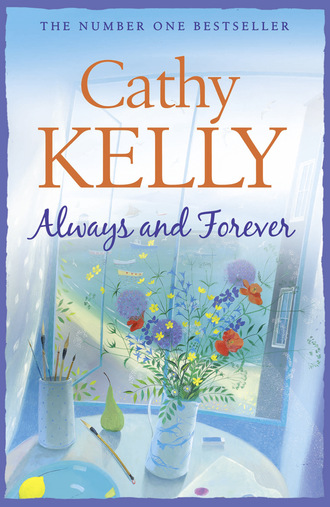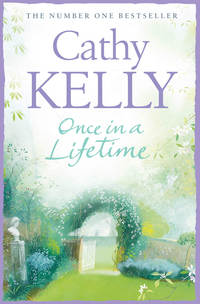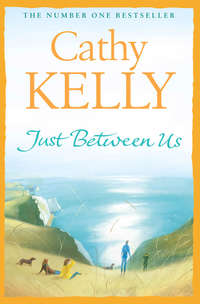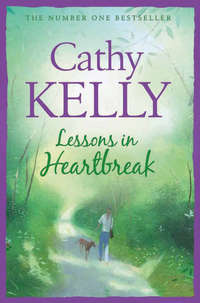
Полная версия
Always and Forever
‘That’s such a man thing to say,’ remarked Mary, who was just divorced and still inhabiting the all-men-are-pigs zone. Mary had started Georgia’s Tiara ten years before, and Daisy had come on board shortly afterwards. Together, they made a great team.
‘Getting married isn’t about not fixing anything. It’s a bigger commitment, that’s all,’ Mary went on. ‘It’s Alex saying he wants the world to know he’s going to be with you for ever. Living with someone can’t do that. Mind you,’ she added gloomily, ‘if I’d just lived with Bart instead of being stupid enough to marry him, we mightn’t have ended up paying the lawyers so much. Every time I see my lawyer in his new Porsche, I feel like saying I own an eighth of that car, so when can I borrow it?’
‘Yes…’ said Daisy, wishing she hadn’t started this. Mary was not the sort of woman to call a spade a metal digging implement and Daisy had just broken her own steadfast rule about couple loyalty. Never speak about your loved one in a negative way. Anything else was too like what she’d grown up with. ‘I suppose I can see Alex’s point,’ Daisy went on untruthfully, backtracking out of guilt. It had been a private conversation with Alex. What on earth had made her spill it all out to Mary? ‘We are happy as we are. I must be premenstrual, that’s it. Ignore me.’
The only plus about not having plans to get married meant that Daisy didn’t have to think about the dilemma of inviting both her parents to the wedding. It had been years since Daisy’s mother had tolerated being in the same town as her father, much less the same room. Nan Farrell had insisted that her husband move out of Carrickwell years ago so she could pretend – to herself, at least – that she was still a person of consequence in the town. Daisy’s father had drifted in and out of her life for years. He lived in San Francisco now and seemed perfectly happy to send and receive nothing more than a Christmas card.
Whenever Vogue had a feature on beautiful brides, Daisy contented herself with the knowledge that she had commitment without the need for an intricate seating plan to keep all her family happy. Her family had been a bit of a non-family all her life. And surely, she reasoned, it was more modern to live with a loved one than rush up the aisle just for the sake of it?
Her second most hated question was even more personal.
‘How did you lose all the weight?’ interrogated all the people who hadn’t seen her for years and who remembered Daisy as the rounded creature she would always remain in their heads.
Ignoring the rudeness of the question – weight was a terribly personal matter and yet so many recklessly demanded to know what you ate for breakfast if it would help them lose a few pounds – Daisy would say that she hadn’t done a thing. Honestly.
For all his charming sociability, Alex was incredibly private and hated anyone knowing he’d been sick, so she couldn’t say that the sheer worry she’d gone through over the two years of his mystery illness meant the weight, three stones of it, had just melted away.
‘Not WeightWatchers, not the Atkins?’ people would then say suspiciously, clearly convinced she was lying through her teeth, lived on nothing but cabbage soup and probably had terrible problems with bad breath.
‘Not a thing,’ Daisy replied, privately wondering was there an opening in the book world for the Epstein Barr Virus Diet.
Alex looked great now. Thanks to the last year as a patient of the fabulous Dr Verdan, he was glowing with health and brimming with his old energy. He was taking enough health supplements to open his own shop, but they all seemed to be working. She hoped the ones she’d begged him to ask Dr Verdan for were helping.
Which led on to the third question, the one that wasn’t asked quite as often. Apparently, people were more aware of the delicacy of asking it these days, so that when a woman reached a certain age and no children had appeared, only the bumbling lumbered in and asked: ‘What about kids? Don’t you want them?’
Unfortunately, there were lots of bumblers out there, people who thought it was perfectly acceptable to ask a healthy thirty-five-year-old woman with a long-term partner if she’d ever considered the notion of children.
Hell, no, Daisy wanted to yell at them. ‘We thought about it but we’ve heard that a child costs 30,000 euro in its first five years, so we’re going to the Bahamas instead.’ Only an answer so flippant could disguise the genuine physical pain she felt when asked such a question.
Because Daisy didn’t want children. She craved them, yearned for them, cried for them in her sleep.
When she was thirty, she’d stopped taking the pill.
‘It’ll be fun making babies,’ Alex had said at the time.
And it had been. Making love and hoping to get pregnant instead of the reverse was very sexy.
‘The mother of my children,’ Alex liked to murmur when he lay above her, his naked body moulded perfectly against her soft lush one.
Daisy had no particular love for her body. It was so defiantly different from what she’d have liked it to be, with rounded everything and fat that spilled out over her size fourteen waistbands, making her move miserably on to size sixteen. But when Alex was holding her gently, and her strawberry-blonde hair streamed around her, creamy skin pillowed out below him as they tried to conceive their child, that was the only time when she felt that she was almost beautiful.
Making babies didn’t work out to be as straightforward as they’d thought, however. It was as if simply deciding to have one, instead of trying hard not to, had suddenly made pregnancy very difficult to achieve.
Magazines were full of miserable stories about declining fertility and how women were leaving it too late to conceive. Daisy hated those articles ever since the day she’d grasped the horrific news that women were born with all the eggs they were ever going to have and it was all downhill from then on.
‘You mean, we don’t make new eggs all the time?’ she asked Paula, who worked in the shop and was addicted to health websites. ‘I thought everything in the human body got replaced every seven years. I read that, I know I did,’ Daisy added anxiously.
‘No,’ said Paula cheerily. ‘You’ve got your lot, I’m afraid. When you’re thirty, so are your eggs.’
Daisy blanched at the thought of her then thirty-year-old eggs and all the things her body had been through.
Could too much alcohol affect your eggs? Think of all those mad nights in her twenties when she’d had so much to drink that she’d almost drunk herself sober. Or drugs. Remember Werner, the Austrian student friend of Alex’s who’d been very keen on smoking dope and who’d encouraged a disapproving Daisy to have a joint with the rest of them on that holiday. She’d never done drugs before, she disapproved of drugs, for heaven’s sake, but she’d been stupid and said yes, and she knew that would come back to haunt her. Stupid cow, how could she not have known about her eggs?
Paula, who was younger than Daisy, didn’t seem too worried about the state of her ovaries and the fact that she hadn’t hatched anything, so to speak.
‘Ah, sure, what’ll be will be,’ she said optimistic ally.
‘Life is not a Doris Day song,’ a little voice inside Daisy’s head raged bitterly. Aloud she said: ‘You’re dead right, Paula. It’s crazy to obsess over these things. We’re only young, after all, and there’s loads of things they can do now to help you have children.’
That thought, the thought of experiments at the cutting edge of science where people would be able to have babies without even being on the same continent as each other, kept her going.
Cutting back on caffeine didn’t kickstart Daisy’s reproductive system. Neither did eating all the so-called superfoods. The vegetable basket looked almost alive with all the green stuff in it, and Daisy did her best to cut down the glasses of wine at the weekend. But her periods came with a regularity she’d sworn wasn’t there in the days when she hadn’t wanted to get pregnant.
Still, there was time on their side, she counselled herself. They were young, healthy, successful in everything they touched.
Georgia’s Tiara became more and more prosperous. Mary gave Daisy a share in the shop.
‘I can sell ice to the Eskimos but I wouldn’t be able to sell it unless you got the right ice,’ Mary said firmly. ‘You’ve put so much effort and energy into this business, you deserve to be a partner.’
Daisy had covered her mouth with her hands like a child. ‘Mary, I can’t believe it. You’re so good to me.’
‘Nonsense.’ Brisk was Mary’s middle name. ‘You’re so good to me, and for the shop. Running a business is second nature to me but I could spend a month of Sundays trying to learn what you do, and I’d still never manage it.’
Buoyed up by this – even her mother would have to say she was doing well – Daisy decided that she wasn’t pregnant because the time wasn’t right. It was like that old Buddhist saying: when the student is ready, the master will appear. She obviously wasn’t ready. Career women had so much trouble balancing kids and work that it was probably easier at this point in her life not to have a child. Then, after a year of baby-making, Alex became sick. It seemed incredible that it had taken so long to get a diagnosis and they had gone through the seven valleys of hell before they’d found out what it was. Even now, Daisy quaked at the thought of what it could have been. She and Alex had suspected leukaemia. Now, she always put money in collection tins that had anything to do with cancer as if to ward off the evil.
But the bugbear had been Epstein Barr, an autoimmune disorder that turned normally energetic people into wrecks. Hard to detect and even harder to cure, the illness had taken its toll on both Alex and Daisy. Baby-making had not been on the agenda then, but it was at the back of Daisy’s mind constantly, the sense of time passing slowly and of her elderly eggs getting even older. She also worried, although she would never say it, that Alex’s illness was part of the problem.
And now they’d come out of the fire, together. For the past two years, Alex had been healthy and said he felt great. She felt great. She was going to get pregnant. It was her time, time to find out why she wasn’t conceiving, if there was a problem with Alex’s sperm due to the Epstein Barr, and to do something about it. The student was ready.
Standing in front of the mirror in their bedroom on a dark Sunday afternoon, Daisy said it out loud: ‘I’m ready. I’m ready to get pregnant. Now.’
Nothing happened. No thunderbolt from on high to tell her that God was listening, no rustling of curtains to tell her that her guardian angel was hovering and would do his or her best.
There was no sign, just as there had never been any sign before.
‘Alex, I want us to have tests to find out what’s wrong. We can’t afford to wait any longer. I’m getting older and…’ Daisy’s monologue to the mirror trailed off. She didn’t want to tell the mirror – she wanted to tell Alex, and now.
She’d spent the weekend thinking of nothing else because, with Alex away, she had lots of time to reflect. He was in London with a group of investors on what he described as a ‘bank hooley’, where good food and expensive wine were laid on to help lubricate people’s cheque books.
Although she hated being alone, his being away gave Daisy a chance to catch up on all the boring household chores, like cleaning the oven before it went up in flames. The oven now gleamed, thanks to much scrubbing on Saturday. But the wardrobe tidying had proved to be a bit of a marathon task.
She’d kept some of her ‘fat’ clothes for when she was pregnant. That silky sweater from Italy, the flowing Pucci shirt, they’d look lovely over a pregnant belly. Daisy had such plans for being a fashionable pregnant woman and now, faced with these clothes and no use for them in sight, her heart ached.
By five on Sunday afternoon, as she turned the bedroom lights on, Daisy realised she’d like nothing better than an early dinner in front of the box, but she still had to put away loads of clothes. At least fifty per cent of everything she owned was in heaps on the floor.
She was holding up a sweater – black, and expensive, so how could she get rid of it, even though it didn’t really suit her? – when the phone rang.
‘Alex, hello.’ Daisy sank onto his side of the bed, cradling the phone into her shoulder, her voice softening with love. ‘How are you? Miss you, you know.’
‘I know, Daisy. But I’ll be home tomorrow evening.’ From his businesslike tone, it was clear that he wasn’t alone.
‘Can’t talk, huh? No problem. How’s it going?’ she asked, suppressing the slightest tinge of irritation that he hadn’t slipped away from the group for a moment to phone her privately. He was on his mobile, it seemed, and she hated those brusque ‘All fine here, how are you?’ conversations.
‘All fine here,’ said Alex, right on cue. ‘And at your end?’
Daisy laughed and did her best to let the irritation slip away. She could hardly have said, ‘Let’s do something about why I’m not getting pregnant,’ over the phone, could she? ‘My end is great but it’s lonely because it doesn’t have your end to snuggle up against in bed. It was freezing here last night,’ she added. ‘I had to resort to my fleece pyjamas and my bedsocks as I didn’t have you to warm me.’ She couldn’t resist the joke. He hated her bedsocks.
‘Really?’ said Alex blankly, but Daisy knew he must be grinning. Only someone who knew him well would hear the amusement over a crackly mobile and hundreds of miles.
‘Really. So hurry home. Me and the bedsocks miss you.’
‘You too. Better rush. We’ve got another meeting before dinner and it will probably be late, so I won’t phone again. See you tomorrow.’
‘Yes, can’t wait.’ She had so much to talk to him about. ‘I know you can’t talk, Alex,’ Daisy said quickly, ‘and you don’t have to reply but I love you.’
There was silence in her ear. He’d hung up.
Daisy made herself put the receiver back without slamming it into the cradle. How was it that women invariably wondered what was wrong, even when there was nothing wrong, and men never divined anything out of the ordinary when emotional war was about to be declared? She’d like to see how pleased Alex would be if she’d hung up on him when she was working away and when he was burning to tell her something.
She dismally surveyed the piles of clothes on the beige carpet. Everything in the apartment was decorated in subtle shades of beige and caramel, with dark brown accents. Alex loved modern minimalism.
Daisy had once wondered how their flat would cope with a small child in it. She loved planning new floor coverings and washable paintwork, or working out how to lay out the baby’s room. How sad was she?
That was it: her enthusiasm had vamoosed. She’d stack everything on her side of the room and do it during the week. There was a pepperoni pizza and oven chips in the freezer, a bottle of chilled wine in the fridge and probably some slushy romantic film on the movie channel. She could even give herself a manicure. And she’d put a conditioning treatment in her hair to bring it back to its glossy, strawberry-blonde glory. Her straightening irons and the colour played havoc with the split ends.
She’d look fabulous for when Alex saw her and he’d be flattened with both guilt and longing, and then she’d tell him what she’d really wanted to talk to him about.
Georgia’s Tiara had two windows looking out onto Delaney Row, a street of grand, three-storey houses on the northern side of Carrickwell, and both windows had the words ‘SALE’ emblazoned across in giant, art deco lettering. Decorated in proprietress Mary Dillon’s favourite lemon yellow, the shop was a clothes lover’s paradise and included a tiny accessory department that sold shoes, bags and costume jewellery, three large changing rooms and, most important of all, sympathetic mirrors.
Mary had most of her warpaint on and was on her second cup of hot water and lemon – awful, but great for the insides, she’d read – by the time Daisy got into the shop on Monday morning.
‘Sorry, traffic was brutal,’ Daisy said, which was pretty much what she always said. The snooze button was just so seductive in the morning. She’d always been able to identify with the Chinese mandarin who insisted on being woken at four every morning just so he had the luxury of knowing he didn’t have to get up yet. ‘And the roadworks on the bridge…shocking.’
‘Paula wanted fresh air so she went across to Mo’s Diner to get the lattes,’ Mary said, not even bothering to reply to the traffic story. The day Daisy arrived on time, Mary would know there was something seriously wrong. ‘Take the weight off the floor and catch your breath,’ Mary continued, handing over a bit of the newspaper.
Paula, who was now five and a half months pregnant with her first child, arrived with the lattes and three of Mo’s famous blueberry muffins, and for a few moments, there was the weekend catch-up as Daisy asked how Paula felt, had the baby been kicking and how many bottles of Gaviscon had she gone through?
‘Two,’ admitted Paula, shamefacedly. She was torn between joy at being pregnant and misery at having heartburn like the eruption of Krakatoa.
‘Only two?’ said Daisy cheerily. ‘You should have shares in the company.’ Today she could joke with Paula. Up to now, she’d found it hard although she did her level best not to show it because she loved Paula and wouldn’t have hurt her for the world. But today felt different. Now that Daisy had decided to take action, the pain had receded a little.
When everyone had their coffee – two lattes, and a decaf for the mother-to-be – blissful peace took over as the women flicked the pages of the tabloids, seeing who’d been wearing what at the weekend.
One of the shop’s best customers, a ladies-who-lunch type who had loads of money and the fashion sense of a Doberman, was pictured at a movie premiere wearing a spaghetti-strapped embroidered dress in midnight blue, a French blue cashmere shrug and string of tourmalines – an outfit that Daisy had put together specifically for her. The only defect was the flash of nude tights visible between the dress and the skinny navy suede boots.
‘You told her to wear black tights,’ groaned Paula.
‘The tights aren’t too bad,’ Daisy said. ‘If she’d done them on purpose, we’d all be saying it was brilliant.’
‘True,’ muttered Mary. There was a fine line in the fashion world between the genius of doing something different and the stupidity of wearing the wrong tights. Likewise, blue eyeshadow could be spectacular on the right person, and a hideous mistake on the wrong one.
The morning was taken up with phone calls about the whereabouts of a shipment of Italian silk print scarves. In between, Daisy lent a hand to a trio who were looking for a mother-of-the-bride outfit that would go with a cream brocade wedding gown, and a bridesmaid’s dress for the bride’s sister.
‘A dress that she can wear again, nothing with big flowers like a huge duvet cover,’ insisted the bride, with the bride’s sister nodding emphatically in the background. Once was quite enough to look like a refugee from the sofa factory – she was not wearing anything flowery and wildly frilly ever again.
Daisy quite liked the challenge of dressing bridal parties. Mary hated it because, in her current post-divorce state, she felt people weren’t being advised of what they were letting themselves in for.
‘There should be something more in the ceremony, something along the lines of a warning that it takes just one day to get married and five thousand days to work yourselves up to the divorce,’ she said darkly, out of range of the happy trio. ‘And bitterness…they never mention bitterness at weddings, do they? That’s the bit that lasts longest. You might have long since forgotten where you’ve put the wedding album, and the Waterford stemware might be scattered all around the house, but by God, you can lay your hands on a bit of bitterness at any time of the day or night.’
Daisy didn’t know what to say as they rummaged around at opposite ends of the storeroom, searching for a pale pink, beaded column dress with butterflies on the hem as well as a wool-silk mix dress with matching coat that would look good on a size sixteen at a winter wedding. It was odd that Mary could be so anti-marriage one minute, and pro-marriage the next. She’d raged at Daisy’s story of how Alex didn’t want to get married. Lately, Daisy had been censoring her conversation with Mary in case she rattled on too much about what she and Alex had done at the weekend, when she knew Mary was sitting at home on her own, worrying about cash flow or never having sex again.
‘I blame Richard Gere,’ Mary sniffed balefully. ‘I thought life was going to be like in An Officer and a Gentleman and look where that’s got me? Bloody nowhere. It’s the uniform that did it for me.’
As Bart had never worn a uniform, Daisy wasn’t quite sure what Mary was on about but she let her ramble.
‘Triumph of hope over dumb bloody stupidity,’ Mary said. ‘Why do we all think we have to get married? What’s wrong with women’s brains that we feel we’re not connected with the world unless we have a man to connect us with it? Men – who needs them?’
Mary’s bedtime reading was currently of the women-who-love-bastards variety. She’d lent Daisy some of her books and Daisy had accepted them out of guilt, but they were still in the back of her car in their plastic bag, necessitating even more guilt. What if Mary saw them, patently unread, and realised that while she was unhappy, not everyone else was?
‘Come on, Mary,’ said Daisy now, feeling that some sort of cheering-up was in order. ‘You’re over Bart, you know you are.’
‘Am I?’ demanded Mary. ‘Because I’m not, you know. I’m sad and depressed and I don’t think I’ll ever feel right again. That’s what marriage does for you, Daisy, and don’t you forget it.’
The lustre had gone out of dressing the wedding party for Daisy. She felt a bit headachey, so as soon as they had gone she nipped out for some painkillers and, on the spur of the moment, decided that a bottle of wine might cheer Mary up.
They closed at six and Daisy cracked open the bottle.
‘Just one glass,’ Mary warned. ‘The kids have a friend over for dinner and I don’t want to get a reputation as the divorced lush. That would give them something to talk about at the school gates. Alone and alcoholic isn’t the sort of thing you want to advertise. Nearly as bad as lonely and desperate for sex.’
‘None for me,’ added Paula, holding up a hand in refusal. ‘If I look at a drink, the baby will emerge phoning the child protection agency and my mother will be scandalised. She’s never got over my sister-in-law having that glass of champagne at our wedding when she was pregnant. She still talks about the irresponsibility of it all.’
Daisy did a quick bottle/person calculation. She never drank more than one glass when she drove.
Mary edged off her shoes, put her feet up on the wicker bin behind the counter, and sighed. ‘Don’t know why I wear those blinking shoes,’ she said, wiggling her toes luxuriously. ‘They ruin my feet. I’ll have bunions soon.’
‘The girl today who was getting married was going to have the full works done in a beautician’s just before the day,’ Paula said. ‘Manicure, pedicure, you name it.’
They all sighed at the thought.
‘I’ve never had a professional pedicure,’ Daisy said. ‘I feel embarrassed enough about having a manicure, my nails are always such a mess, but my feet…ugh. That would be worse. I think they’d need industrial sanding equipment to get the hard skin off my feet and then the beautician would look at me and think I was a right old hick. No, I can’t face it. I’d prefer to do it badly myself.’
‘Ah, they don’t care about the state of your feet,’ Mary said. ‘See enough feet and you can cope with anything. I’ve had everything done over the years. Feet, hands, that wrapped-up-like-a-mummy thing that makes you lose inches. Stinks, though; you feel smelly for the whole day with the mud. Can’t afford any of it now, of course, thanks to Bart. Plus I don’t have the time.’








